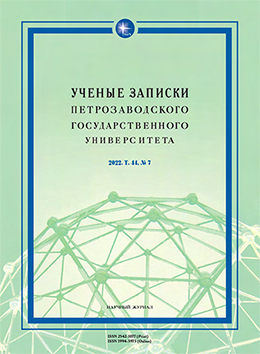ЛЕКСИКО-СЕМАНТИЧЕСКАЯ ГРУППА «ОТСУТСТВИЕ РЕЧИ»
В РУССКОЙ ПОЭЗИИ: КОНСТРУКЦИИ ПЕРСОНИФИКАЦИИ
LEXICO-SEMANTIC GROUP “ABSENCE OF SPEECH” IN RUSSIAN POETRY: CONSTRUCTIONS OF PERSONIFICATION
Author(s): Zoya Yurievna Petrova, Olga I. Severskaya, Natalia Aleksandrovna FateevaSubject(s): Language and Literature Studies, Lexis, Semantics, Russian Literature, Theory of Literature
Published by: Петрозаводский государственный университет
Keywords: personification; poetic language; metaphor; comparative trope; lexico-semantic group; silence
Summary/Abstract: The article addresses the issue of describing the system of metaphors and similes and its evolution in Russian literature, with particular focus on one of its constituent parts – a set of comparative tropes of the Russian poetic language of the XIX–XXI centuries, which contains the images of comparison from a lexico-semantic group with the meaning of negation of speaking, which, in turn, is included into the semantic field “Language, speech”. The relevance of the work is determined by the need for a detailed description of the system of metaphors and similes using a large array of material in the language of fiction, taking into account corpus data. This study is aimed at giving a comprehensive and multifaceted description of the fragment of the system of metaphors and similies of Russian literature, and studying its evolution over two and a half centuries. The research objectives were to describe a set of comparison images belonging to the lexico-semantic group “Absence of speech”, to identify the semantic classes of the comparison objects – those entities that are figuratively characterized by the words from the studied group, to describe the evolution of these classes and the evolution of the analyzed lexico-semantic group containing the comparison images in the Russian poetic language of the XIX–XXI centuries, to analyze the specifi c features of using the comparison images from the said lexico-semantic group in poetic texts. The set objectives meet the criteria of research novelty: it is the fi rst-of-its-kind study that offers a systematic multifaceted description of metaphors and similes, whose comparison images belong to a certain lexico-semantic group, based on extensive corpus data, with the analysis of the evolution of the corresponding fragment of the system of comparative tropes. The corpus method, the semantic fi eld method, and the structural functional method were used for the language material analysis. The authors identified the composition of the lexico-semantic group “Absence of speech” and conducted the corpus analysis of its elements serving as personifiers in poetic texts. The authors also singled out the following semantic classes of the comparison objects characterized by the studied personifiers: “The outside world” (“Nature” and «Man-made objects”), “Time” and “Man’s inner world; socio-philosophical dimension; life, death, fate; linguistic phenomena”. The early segment of the studied fragment of the metaphorical system was determined, which includes the traditional images and comparison objects for the corresponding comparative tropes. The conclusion was made about the evolution of this fragment over two and a half centuries of the Russian poetic language development, namely that the classification of the objects and images of comparison was eventually updated. Special attention was paid to the evolution of the comparison images from the lexico-semantic group “Absence of speech”: the authors concluded that it was expanded through derivation and synonymy, with the special role of stylistically marked words and phraseological combinations in updating traditional semantic invariant of the studied class of comparative tropes. The study results present a fragment of the metaphorical system of the Russian poetic language of the XIX–XXI centuries in its development.
Journal: Ученые записки Петрозаводского государственного университета
- Issue Year: 44/2022
- Issue No: 7
- Page Range: 8-18
- Page Count: 11
- Language: Russian

